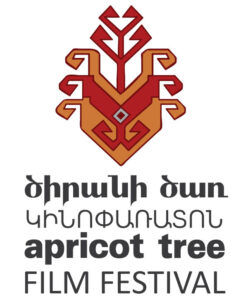About Our Festival
Established in 2015 by Filmadaran Film Culture Development NGO, Apricot Tree (ATIEFF) is a documentary film festival that takes place annually in an Armenian village in late August. The first edition took place in Yerevan, the second was a split between Yerevan, the city of Gyumri, and the village of Ujan. Finally, in 2017 the festival established itself in Ujan for the next 6 years. In 2023, the festival moved to the village of Debed in Lori.



The idea to organize a village film festival came from the desire to decentralize the cultural life in Armenia, where the vast majority of cultural events take place in the capital city of Yerevan and the rural population is basically devoid of opportunities to come into contact with international and even local art. After the collapse of the Soviet Union, villages were mostly ignored by cultural policymakers for 3 decades. Apricot Tree has the aim of righting this wrong and making the rural population an active and integral part of modern Armenian cultural life.


Despite COVID-19, the 44-Day War in Artsakh, and the sudden death of Martun Adoyan, a great friend and supporter of our festival, the 6th Apricot Tree IDFF took place in 2020 in Ujan on September 14-20 and on November 23-30 online. Our village film school students made 2 films. A very special moment was famed composer Tigran Mansuryan’s visit to Ujan and Antares Publishing’s generous donation of books to the village House of Culture.

The festival format has already bore fruits. The Grand Prize winner of the 2017 edition Shahram Badakhshan Mehr was so enchanted by the village atmosphere and his host family that he came back to Ujan in 2019 and shot a feature-length Iranian-Armenian coproduction docudrama Ujanian Story, which had its world premiere as the opening film of the VII Apricot Tree IDFF in 2021.

The festival organizers strongly believe that only by coming into contact with the other do we grasp ourselves. By grasping ourselves, we seek to understand and get to know the other and by understanding, we start to sympathize with them. In contrast, the unknown and the unclear generate fear, distrust, and enmity. Understanding the life, manners and traditions, struggles and experiences of other nations, tribes, social and religious groups – this is what Apricot Tree calls for and aspires to. And nothing can realize that aspiration better and more effectively, than the week-long coexistence in the same space of people from various parts of the world and also “documentary” cinema, which lets the audience not only see but also sympathize with the reality of the screen.
 The festival screens documentary films of all genres, including ethnographic, anthropological, experimental, and even animated. Non-competition programs include tributes to renowned filmmakers and special screenings. In total, the festival screens around 30-35 films every year.
The festival screens documentary films of all genres, including ethnographic, anthropological, experimental, and even animated. Non-competition programs include tributes to renowned filmmakers and special screenings. In total, the festival screens around 30-35 films every year.
 In 2024, 19 films will be presented in the Feature-length and Short films competition programs. The Non-Competition section will see the celebration of the centennials of Sergei Parajanov and Charles Aznavour and the 140th anniversary of Robert J. Flaherty. A small retrospective program will pay tribute to this year’s jury member, French-Armenian documentary filmmaker Jacques Kebadian.
In 2024, 19 films will be presented in the Feature-length and Short films competition programs. The Non-Competition section will see the celebration of the centennials of Sergei Parajanov and Charles Aznavour and the 140th anniversary of Robert J. Flaherty. A small retrospective program will pay tribute to this year’s jury member, French-Armenian documentary filmmaker Jacques Kebadian.
In 2019 the festival also established the Ujan Film School, where young Ujanians 12-15 years of age learned to develop their artistic ideas and make their own short documentary films with various equipment, especially their mobile phones. The films were then screened at the closing ceremony of the festival. The summer of 2023 saw the implementation of the three-month-long Debed Film School program, the fruits of which will be screened at the closing. In 2024, the works of the Debed film school students will also be showcased at the Closing Ceremony on August 31.
